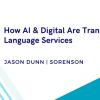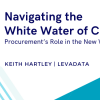Ravichandran Venkataraman is the Founder of Alive Consulting and a former Senior VP and Head of Global Business Services for HP - as well as a long-time columnist for Outsource. Who better, then, to launch our new Life Lessons interview series: set questions aimed at bringing out learnings from the careers of professionals in the sourcing, outsourcing and business transformation community for our readers' enlightenment and entertainment? Over to you, Ravi...
What has been the single most significant development to impact your profession or area of business during your career, and why?
Technology and the maturing of workflows. It was workflow engines that enabled the outsourcing or offshoring business to go global in the late '90s and early part of 2000. Till then, organisations were more regional with lots of documents flying around: only courier companies raked in the money. As technology improved and intelligent workflows that could take images and approvals around the globe took shape, it became easy to globalise. The disruptor for these courier companies was actually workflow engines! The importance of this was that it taught everyone that "Economics is a great leveler" - it took jobs from high-cost countries to low-cost ones but it also created significant possibilities for high-cost countries. For example, while we created so many jobs in India, these Indian offices had items from toilet paper to water to stationery to carpets to furniture to computing and telecom equipment all imported from various countries. I would jokingly say that at my office, only the human beings were Indian. Everything else came from some other part of the world.
Similarly, what one factor has most profoundly changed the way you personally work since your first day in your first job?
From Day 1 at my first job, I have always set my targets for the year. It was always ambitious and I tried my best to be better than what I was the previous year. Never once has my manager set targets for me in my entire career spanning 30+ years.
What’s the biggest challenge facing your industry today – and how would you solve it?
Though I am not working for any company in the outsourcing/offshoring division, I do consult in that segment. The biggest challenge facing the industry (and has always been facing this industry) has been how to drive change within an organisation when it comes to outsourcing or offshoring. I have seen the pendulum swing wildly depending on who leads the organisation - from terrific support to absolutely none. It is not easy to solve. However, one solution that comes to mind is that the resistance to change comes from "Loss of job" and "Reduction in the dimension of the role". For the former, what has worked for me is to give ample notice to staff and to help them find other opportunities, to re-skill them so that they can take on other opportunities. I remember that when I set up a fund to re-train, someone in my team actually took the opportunity to become a hair stylist and set up her own shop and is flourishing now! As regards the latter, let us examine it with an example. Say the organisation is asking a Vice President (VP) to offshore a part of her/his team. The VP says "fine" and does it. The VP knows that her/his role is at a VP level because s/he manages a budget of $xx or revenue of $xx and has so many headcount under him/her. If either of these dimensions reduce, the organisation then asks the question as to why that role should be at a VP level. Now, if the organisation does not address this, why would that VP support outsourcing/offshoring? To drive change, organisations must not only talk of benefits, but also address these two aspects.
Who has been the most influential figure in your professional life, and why?
Two individuals at HP come to mind for me. One is Bob Shultz. To me, he is the guru of offshoring. What he taught me in 2000-2003 still stands as some of the best things I learnt about this industry. He was able to see how this industry would take shape over the next 15 years. An amazing visionary. The other person is Juergen Reiners. He was one of the best leaders as regards execution excellence. He could deliver any crazy vision of Bob and it would get done with German precision. Juergen also taught me how to hire the right person - he took calculated risks and focused on attitude rather than just past experience.
What’s the biggest mistake, work-wise, you’ve ever seen – and what were the consequences?
Whilst I have seen few blunders made by others, I will focus on the biggest mistake I made. There was a time when things were going phenomenally well for me at work. I was seen as a superstar and there came a time when the organisation asked me to do two roles. These were full-time roles in their own right and I got carried away by the tag "Top Talent". In fact, I was doing three roles at that time. The needs of each role pulled me all over the place and there came a time when I had to be in two different countries to do justice to the roles. It not only killed my performance but also taught me an amazing lesson that however great a talent you are at work, there are limits and you need to recognise those. I started failing in one of the roles and so I quickly gave up two roles and started focusing on only one of them. But, it took me six months to realise this and those six months were costly.
What’s the most awkward work-related conversation you’re ever had?
Honestly, none. We all get to work with the best of intentions and if everyone understands that and does not question intent, there are very few awkward conversations. But, one that could come close was when I stood in front of a team of 150+ in Sydney, Australia and told them that we are commencing offshoring and that some of them would lose their jobs a year later. After I finished talking, one lady asked me if I was making this talk so that I could wash away my sins. I knew I was doing my best to save some jobs, provide re-skilling budgets as well as get alternate jobs through out placements. But, I fully understood her position. She was in her 50s and if she was going to lose her job, it would put her in a very tight position. So, I did answer that question in front of 150+ staff in my team but it was not easy and at the end of it she was not convinced. But, the bright side was that the others appreciated the honest response I gave her. It actually turned the tide in my favour.
What do you consider to be your greatest achievement career-wise?
The ability to realise and understand that whatever position you reach, you are different from the seat that you occupy. The minute you are out of that seat, everyone sees you for the individual that you are and not the position. If you cannot differentiate yourself from the position, you will struggle to get out of that seat.
What’s your biggest (as-yet) unfulfilled ambition – and are you going to achieve it?
In my professional career, I got to a level that I never even dreamt of in my wildest dreams. However, if I want to talk of something that I want to achieve it would be to take the not-for-profit social organisation that I work with to educate 100,000 rural children in India. We are only at 4,000+ today and have a long way to go... But, with the help of this universe, I am sure that we will get there.
What three words do you think your colleagues and peers would use to describe you? And what three words would you use to describe them?
Peers always saw me as a "Good human being". My description would be "Trustworthy all through".
Finally, what piece of advice would you give your younger self at the very start of your career?
Focus first on relationship building and then on "process, transactions and achievements".
Do you think you - or someone you know - would make a good subject for future instalments of Life Lessons? Contact the junior editor at hcorr@sig.org for more information...




